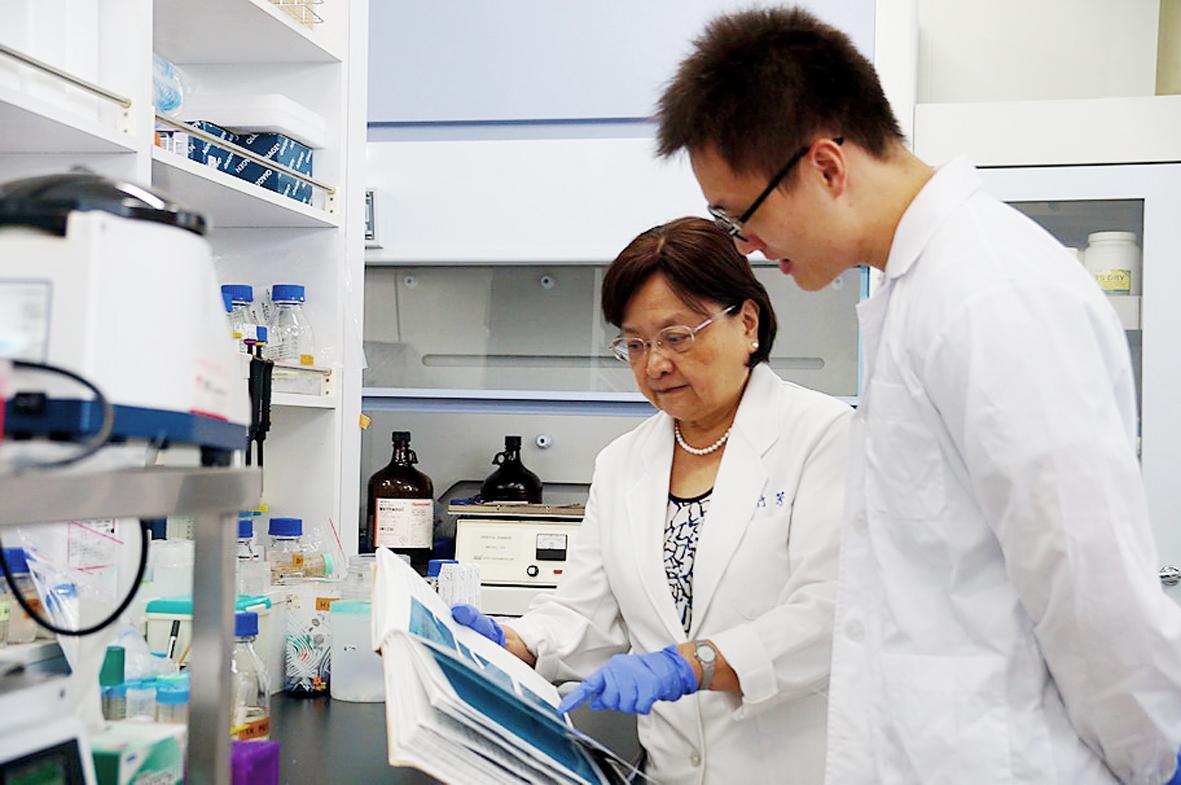Retired professor Luo Chu-fang (羅竹芳) has become the first Taiwanese to win a World Organisation for Animal Health (OIE) honorary award, National Cheng Kung University said on Sunday.
The OIE confers annual awards for outstanding contributions to the control of animal disease and/or veterinary public health.
Luo was honored for her research into shrimp diseases, which led to her lab becoming famous for studying new shrimp diseases and the development of diagnostic tools to detect viral diseases in shrimp, the school said in a statement.

Photo courtesy of National Cheng Kung University
Luo taught at National Taiwan University, where she conducted the bulk of her research, before transferring to Cheng Kung in 2013, where she taught until her retirement last month.
Despite her retirement, Luo’s enthusiasm for research is unabated, and she is working on the nation’s first standardized shrimp breeding area in Hualien County, the statement said.
Luo began studying crustaceans in 1994 after witnessing the effects of the white spot syndrome virus on shrimp and the aquaculture industry.
Her research at the time on the pathogenic mechanisms of white spot disease, which is caused by a virus, was very important, a person in the shrimp industry said.
Scientists had thought that the disease was caused by a baculovirus, but Luo used DNA sequencing and viral pathogen assembly mechanisms to determine that it was caused by a new virus.
Thanks to that research, Luo’s lab was designated a reference lab by the OIE.
Having published several papers on shrimp breeding while at NTU, after switching schools, she used the results to help aquaculture farmers develop their businesses, Luo said.
While at Cheng Kung, Luo studied the breeding of specific pathogen-free shrimp and cultured shrimp resistant to viral diseases, set up a research and development center for shrimp aquaculture, and built a high-tech shrimp farm to promote a new form of shrimp farming management.
In 2013, Luo collaborated with researchers in Thailand to develop diagnostic kits for the detection of viral diseases in shrimp, which have tremendously benefited the marine biotechnology industry and shrimp aquaculture, Cheng Kung said in the statement.

The Grand Hotel Taipei on Saturday confirmed that its information system had been illegally accessed and expressed its deepest apologies for the concern it has caused its customers, adding that the issue is being investigated by the Ministry of Justice Investigation Bureau. The hotel said that on Tuesday last week, it had discovered an external illegal intrusion into its information system. An initial digital forensic investigation confirmed that parts of the system had been accessed, it said, adding that the possibility that some customer data were stolen and leaked could not be ruled out. The actual scope and content of the affected data

DO THEY BITE IT? Cats have better memories than people might think, but their motivation is based entirely around the chance of getting fed Cats can remember the identity of the people who fed them the day before, Taipei-based veterinarians said on Friday, debunking a popular myth that cats have a short memory. If a stray does not recognize the person who fed them the previous day, it is likely because they are not carrying food and the cat has no reason to recognize them, said Wu Chou Animal Hospital head Chen Chen-huan (陳震寰). “When cats come to a human bearing food, it is coming for the food, not the person,” he said. “The food is the key.” Since the cat’s attention is on the food, it

‘LIKE-MINDED PARTNER’: Tako van Popta said it would be inappropriate to delay signing the deal with Taiwan because of China, adding he would promote the issue Canadian senators have stressed Taiwan’s importance for international trade and expressed enthusiasm for ensuring the Taiwan-Canada trade cooperation framework agreement is implemented this year. Representative to Canada Harry Tseng (曾厚仁) in an interview with the Central News Agency (CNA) said he was increasingly uneasy about Ottawa’s delays in signing the agreement, especially as Ottawa has warmed toward Beijing. There are “no negotiations left. Not only [is it] initialed, we have three versions of the text ready: English, French and Mandarin,” Tseng said. “That tells you how close we are to the final signature.” Tseng said that he hoped Canadian Prime Minister Mark Carney

President William Lai (賴清德) yesterday bestowed one of Taiwan’s highest honors on Saint Vincent and the Grenadines (SVG) Ambassador Andrea Clare Bowman in recognition of her contributions to bilateral ties. “By conferring the Order of Brilliant Star with Grand Cordon on Ambassador Bowman today, I want to sincerely thank her, on behalf of the Taiwanese people, for her outstanding contribution to deepening diplomatic ties between Taiwan and SVG,” Lai said at a ceremony held at the Presidential Office in Taipei. He noted that Bowman became SVG’s first ambassador to Taiwan in 2019 and